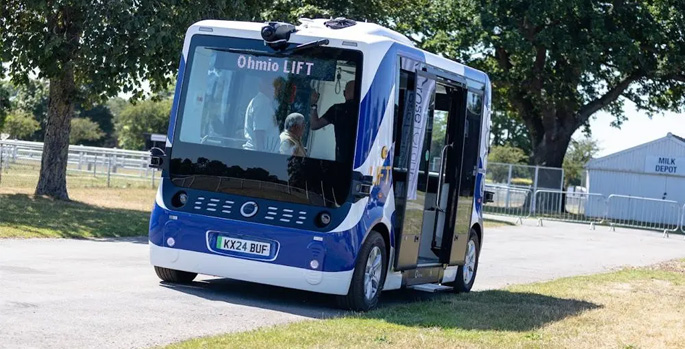The Government has provided up to £2m through a pathfinder feasibility studies competition to support 14 automated vehicle projects.
Delivered by the Centre for Connected and Autonomous Vehicles (CCAV) and supported by Zenzic and Innovate UK, the Connected and Automated Mobility (CAM) Pathfinder will allocate a share of the £2m to a range of schemes, including urban automated shuttles and pods.
The ADASTRA study, carried out with Suffolk County Council, won £75,000 to explore the feasibility of introducing self-driving shuttle vehicles into the county’s transport network.
Cllr Chris Chambers, cabinet member for transport strategy, planning and waste, said: ‘ADASTRA will enable us to test our ideas with passengers and stakeholders, giving people the chance to see the shuttles in action and build out the longer-term business case.’
Ian Pulford, director at Smart City Consultancy, added: ‘ADASTRA is an important first step toward delivering a Suffolk-wide Mobility Hub network that connects people, services and opportunities—ultimately creating jobs and transforming the way we travel.’
Another recipient of this cash is the CitiPod study in Cambridge.
Led by Cambridge Electric Transport and delivered by Innovate UK and Zenzic alongside the Greater Cambridge Partnership, this project will look at how lightweight and electric autonomous pods can be integrated into the city’s public transport system.
Mark Cracknell, programme director at Zenzic, said: ‘The deployment of Connected and Automated Mobility solutions holds incredible promise – enhancing accessibility, reducing emissions, and fostering a transport network that is both reliable and inclusive. The CitiPod project will serve as a pivotal example in showcasing those benefits.’
Dan Clarke, head of technology and innovation at Greater Cambridge Partnership, said: ‘This is an early-stage research project that explores how low-speed autonomous vehicles could reshape the way people and goods move around Cambridge.
‘Beyond passenger transport, there is potential for lightweight, electric pods to support, for example, more sustainable freight movements and improve accessibility in our city. It’s about understanding how this technology could complement our existing transport network and help us build a cleaner, more inclusive future for everyone.’
The full list of winners from the CAM Pathfinder competition is:
- London Bus Depots, led by Transport for London, Fusion Processing, Metroline, and Alexander Dennis
- Autonomous Impact Protection Vehicle, led by Ringway, Colas, Fusion Processing, TRL, and ACKLEA
- CitiPod, led by Cambridge Electric Transport and Cambridgeshire County Council
- eFREIGHT, led by Voltempo, Catapult, and Berkeley Cars
- GAMMA – Glasgow Automated Mobility Mass-Transit Accelerator, led by DG Cities, Admiral, and ZF
- ADASTRA Feasibility Study for Self-Driving Shuttles in Mobility Hubs, led by Suffolk County Council and Smart City Consultancy
- Kirkwall Autolink – Outline Business Case for Autonomous, Zero-Emission Shuttle Service, led by Urban Foresight, Aurrigo, and The Highlands and Islands Transport Partnership (HITRANS)
- NAVIGATES – Networked AV Integration and Governance with Advanced Technology and Security, led by Angoka and Cenex
- Runway to Autonomy – Removing NUIC Obstacles for Autonomous Baggage Handling Vehicles, led by International Airlines Group (IAG) and RDM Group
- MAEVe – Modular Automated Electric Vehicle, led by Aim Technologies, EVIE, and Cavonix
- Unified Neutral Net-Radar, led by Radareye and EnSilica
- Opt Tech 4 Auto & RC, led by Atera Analytics Ltd
- Dora – Developing Objective and Quantifiable Risk Assessment for CAV, led by IDIADA and the University of Warwick’s Warwick Manufacturing Group (WMG)
- CAM4Events – Exploring Deployment of CAM Technologies and Services for Events, led by You Smart Thing Ltd, Transport for West Midlands, Syselek, and AJW.






